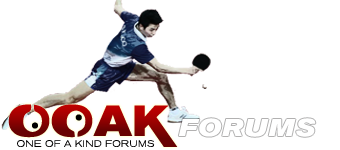 |
OOAK Table Tennis ForumA truly International Table Tennis Community for both Defensive and Offensive styles! |
  
|
| It is currently 18 Apr 2024, 17:52 |
 |
OOAK Table Tennis ForumA truly International Table Tennis Community for both Defensive and Offensive styles! |
  
|
| It is currently 18 Apr 2024, 17:52 |

Don't want to see any advertising? Become a member and login, and you'll never see an ad again!
|
All times are UTC + 9:30 hours |
 
|
Page 276 of 568 |
[ 8509 posts ] | Go to page Previous 1 ... 273, 274, 275, 276, 277, 278, 279 ... 568 Next |
|
| Author | Message | ||||||
|---|---|---|---|---|---|---|---|
| wilkinru |
|
||||||
Joined: 06 Jun 2015, 13:09 Posts: 1224 Location: Las Vegas Has thanked: 82 times Been thanked: 91 times |
|
||||||
| Top | |
||||||
| ziv |
|
||||
Joined: 13 Nov 2018, 03:27 Posts: 529 Location: FL, USA Has thanked: 71 times Been thanked: 113 times Blade: Yinhe V14 Pro FH: Harder Chinese rubber BH: Softer Chinese/ESN rubber |
|
||||
| Top | |
||||
| NextLevel |
|
||||||
Joined: 13 Dec 2011, 10:45 Posts: 3578 Has thanked: 303 times Been thanked: 305 times Blade: Joola Vyzaryz Trinity FH: Golden Tango BH: Golden Tango |
|
||||||
| Top | |
||||||
| BRS |
|
|||||
Joined: 08 Apr 2015, 11:50 Posts: 1515 Has thanked: 13 times Been thanked: 188 times |
|
|||||
| Top | |
|||||
| pgpg |
|
||||||
Joined: 23 Oct 2013, 00:48 Posts: 1811 Location: Boston Has thanked: 621 times Been thanked: 396 times Blade: Butterfly Defense Alpha FH: H3 Neo BH: Cloud & Fog III OX |
|
||||||
| Top | |
||||||
| wilkinru |
|
||||||
Joined: 06 Jun 2015, 13:09 Posts: 1224 Location: Las Vegas Has thanked: 82 times Been thanked: 91 times |
|
||||||
| Top | |
||||||
| ziv |
|
||||
Joined: 13 Nov 2018, 03:27 Posts: 529 Location: FL, USA Has thanked: 71 times Been thanked: 113 times Blade: Yinhe V14 Pro FH: Harder Chinese rubber BH: Softer Chinese/ESN rubber |
|
||||
| Top | |
||||
| NextLevel |
|
||||||
Joined: 13 Dec 2011, 10:45 Posts: 3578 Has thanked: 303 times Been thanked: 305 times Blade: Joola Vyzaryz Trinity FH: Golden Tango BH: Golden Tango |
|
||||||
| Top | |
||||||
| Dr.Pivot |
|
||||||
Joined: 28 Nov 2016, 13:21 Posts: 1029 Has thanked: 47 times Been thanked: 35 times Blade: Stiga Carbonado 45 FH: DHS Hurricane 3 Neo BH: DHS Hurricane 8-80 |
|
||||||
| Top | |
||||||
| Richfs |
|
||||
Joined: 18 Sep 2018, 20:13 Posts: 133 Has thanked: 3 times Been thanked: 3 times |
|
||||
| Top | |
||||
| wilkinru |
|
||||||
Joined: 06 Jun 2015, 13:09 Posts: 1224 Location: Las Vegas Has thanked: 82 times Been thanked: 91 times |
|
||||||
| Top | |
||||||
| NextLevel |
|
||||||
Joined: 13 Dec 2011, 10:45 Posts: 3578 Has thanked: 303 times Been thanked: 305 times Blade: Joola Vyzaryz Trinity FH: Golden Tango BH: Golden Tango |
|
||||||
| Top | |
||||||
| BRS |
|
|||||
Joined: 08 Apr 2015, 11:50 Posts: 1515 Has thanked: 13 times Been thanked: 188 times |
|
|||||
| Top | |
|||||
| pgpg |
|
||||||
Joined: 23 Oct 2013, 00:48 Posts: 1811 Location: Boston Has thanked: 621 times Been thanked: 396 times Blade: Butterfly Defense Alpha FH: H3 Neo BH: Cloud & Fog III OX |
|
||||||
| Top | |
||||||
| NextLevel |
|
||||||
Joined: 13 Dec 2011, 10:45 Posts: 3578 Has thanked: 303 times Been thanked: 305 times Blade: Joola Vyzaryz Trinity FH: Golden Tango BH: Golden Tango |
|
||||||
| Top | |
||||||
 
|
Page 276 of 568 |
[ 8509 posts ] | Go to page Previous 1 ... 273, 274, 275, 276, 277, 278, 279 ... 568 Next |
All times are UTC + 9:30 hours Users browsing this forum: No registered users and 61 guests
Who is online
You cannot post new topics in this forum
You cannot reply to topics in this forum
You cannot edit your posts in this forum
You cannot delete your posts in this forum
You cannot post attachments in this forum